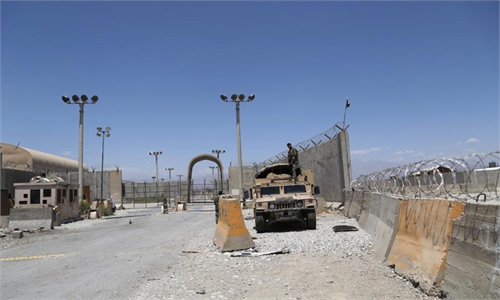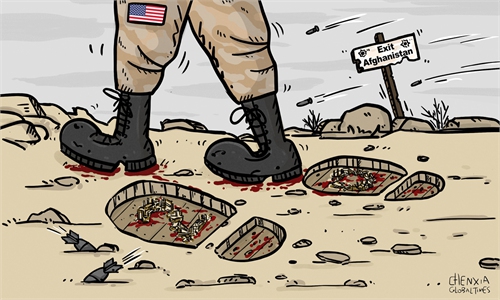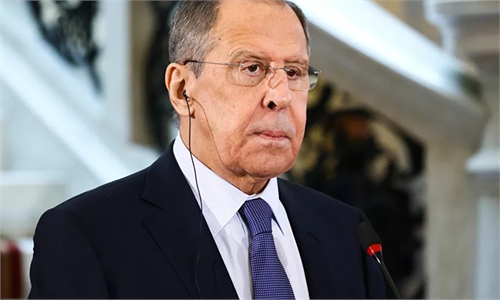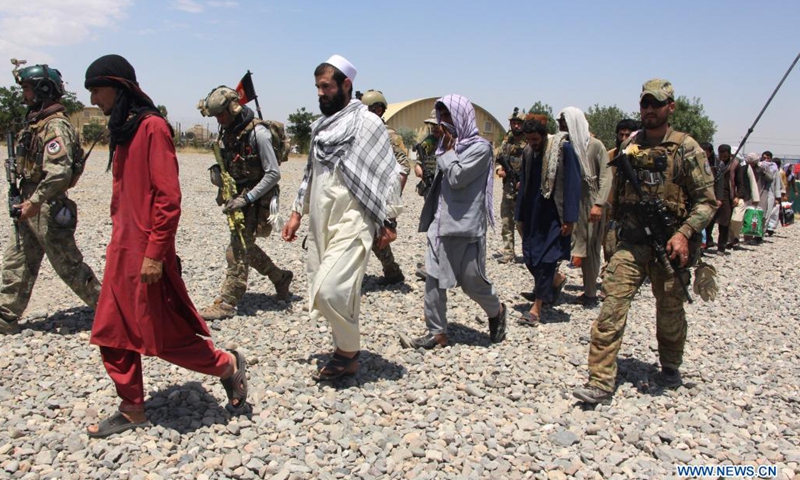
Photo taken in Kunduz city, Afghanistan on May 26, 2021 shows people who were rescued by Afghan Special Forces from a Taliban detention center located in neighboring Baghlan province. A total of 62 hostages including 36 security personnel have been set free after the Afghan Special Forces stormed a Taliban detention center in northern Baghlan province on Wednesday, an army statement said.(Photo: Xinhua)
A high-level Afghan government delegation and the Taliban will meet in Qatar this week to jumpstart the long-stalled peace process, a senior Afghan official who spoke on the condition of anonymity confirmed with the Global Times on Thursday, saying "this is in the agenda" and the meeting will probably be held on Saturday.
But uncertainties loom large, as the Afghan government has low trust in the sincerity of the Taliban. In an exclusive interview with the Global Times, Afghan Ambassador to China Javid Ahmad Qaem expressed deep distrust toward the Taliban.
Meanwhile, engagement among stakeholder countries, especially under the framework of the just concluded Shanghai Cooperation Organization (SCO) Foreign Ministers' Meeting in Dushanbe, Tajikistan, is intensive, in a bid to jointly find a way out for the peace in Afghanistan.
Hotly discussed issues include whether peace talks could start between the two contesting sides of Afghanistan, whether the international community is ready to engage with the Taliban, major power rivalry and cooperation in Afghanistan and counter-terrorism situation in South Asia.
Obstacles to peace talks
Violence in Afghanistan has risen sharply as the US and its allies pull out their troops.
The Taliban reportedly plans to present a written peace proposal to the Afghan government as soon as next month, media reported.
But it is almost impossible to believe in their sincerity, Afghan Ambassador Qaem told the Global Times in an exclusive interview, saying "the way they are behaving with people now is beyond explanation."
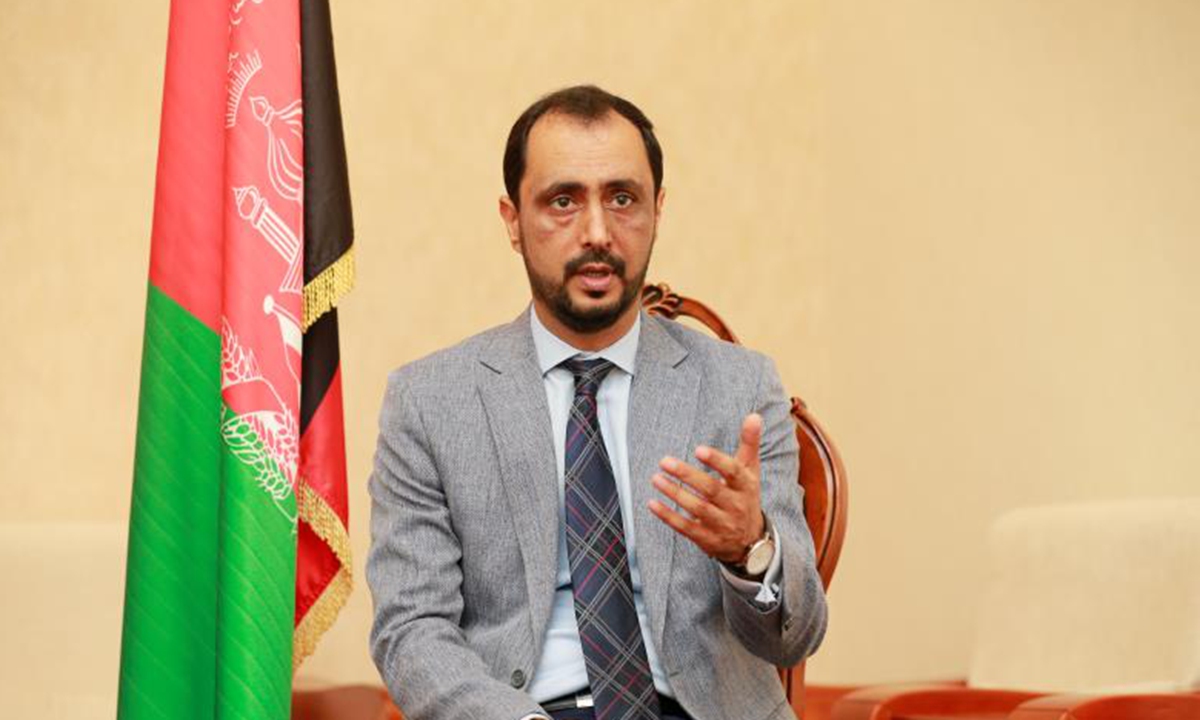
Afghan Ambassador to China Javid Ahmad Qaem Photo: Li Hao/GT
"The sincerity of the Taliban for peace talks leaves a very big question mark upon them," Qaem said, adding that the biggest challenge to the political settlement is the Taliban itself.
"The moment the Taliban accept a ceasefire, their entire movement would be finished. That's why I was saying that we have doubts about their sincerity," said Qaem.
On Wednesday, Zamir Kabulov, Russian President Vladimir Putin's special representative for Afghanistan, urged the Afghan government to start proper negotiations with the Taliban, ahead of talks on the Afghan issue in Dushanbe.
Chinese State Councilor and Foreign Minister Wang Yi said on Wednesday in a meeting with Afghan Foreign Minister Mohammad Haneef Atmar in Dushanbe that China is ready to facilitate inter-Afghan negotiations in China at any time and contribute to a political settlement.
Xiao Bin, a research fellow at the Institute of Russian, Eastern European and Central Asian Studies at the Chinese Academy of Social Sciences, told the Global Times that China is most willing to see that a peaceful resolution is reached and its biggest concern remains the security of its neighbors.
"China could actively become involved in the Afghan peace process based on its own interests. It can make good use of the UN, the SCO and the China-Afghanistan-Pakistan-Tajikistan anti-terror mechanism," said Xiao.
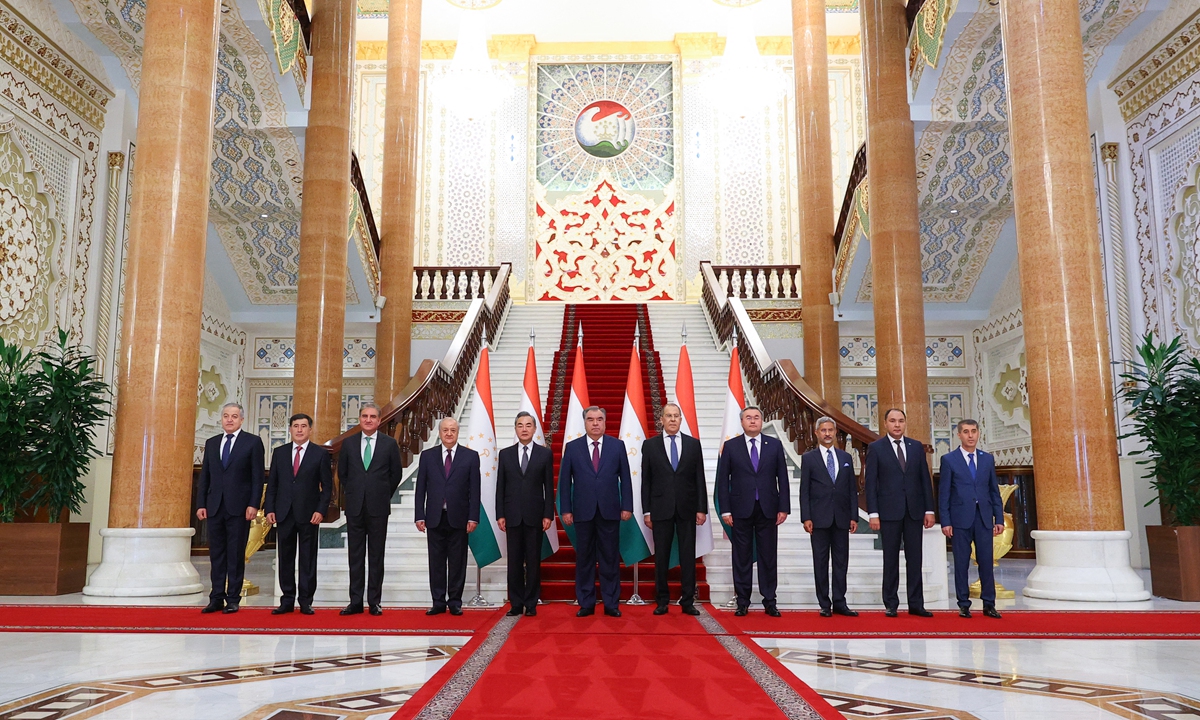
Foreign ministers and officials of the Shanghai Cooperation Organization pose for a photo at a meeting in Dushanbe, Tajikistan. The security situation in Afghanistan dominated the meeting. Photo: AFP
Li Xinwei, an associate professor at the Afghan Research Center at Shaanxi Normal University, believes China and Russia are in a better position to facilitate peace talks among all stakeholders.
"China and Russia have the ability to establish platforms for talks. India has a deep level of cooperation with the Afghan government and Pakistan's stance is also clear, but they are unlikely to maintain neutrality and therefore will not be accepted by both the Afghan government and the Taliban as potential peace-brokers," said Li.
Taliban gestures and international response
Taliban spokesman Suhail Shaheen recently said that the group "will not allow anyone - whether it is an individual or an entity - to use the soil of Afghanistan against the United States, its allies, or any other country, and that includes China."
The Taliban said it sees China as a "friend" to Afghanistan, hoping for Chinese investment to help reconstruction work in the war-torn country. It said it won't interfere in China's internal affairs.
A Taliban delegation in Moscow also reassured Russia earlier this month that it would not allow the country to be used as a platform to attack others.
Ambassador Qaem believes that these remarks are "only just for the sake of gaining some support," calling the Taliban "a threat to the region."
Zhu Yongbiao, director of the Center for Afghanistan Studies at Lanzhou University, told the Global Times that the Taliban's current gesture to the international community is more like an "opinion war" which does not require any cost, with which China needs to make rational and objective assessments.
The Taliban has claimed it controls 85 percent of Afghan territory, which Afghan Ambassador Qaem believes to be untrue.
The Washington-based Foundation for the Defense of Democracy's Long War Journal, which tracks the Taliban's control over the country, reported in late June that among all Afghan districts, 219 were controlled by the Taliban, 78 by the Afghan government and 110 contested. If population is taken into consideration, the average population in Taliban-controlled districts is 63,400, and the average population in government-controlled districts is 132,800.
Xiao Bin from the Chinese Academy of Social Sciences, told the Global Times that the Taliban may control more districts now compared to late June, but the population ratio won't change much.
"As the Taliban expands its territory with its 70,000 militants, it faces the problem of governing newly controlled areas, which will weaken its power. In other words, the closer the Taliban gets to core government-controlled areas, the more difficult it becomes for the Taliban to claim victory," said Xiao.
"We have no doubt that with the capabilities of our armed forces, we can hold on. There is no question about it. The Taliban couldn't choose a more worse time than now to start their attacks. We are confident that the Afghan government and its forces could end it. We will defend it," Qaem told the Global Times.
But still, the international community has begun to talk about what happens if the Taliban wins in Afghanistan.
British Defense Minister Ben Wallace told media on Tuesday that the UK will work with the Taliban if they take back power in Afghanistan.
Roman Babushkin, the Deputy Ambassador of Russia to India, said on Wednesday that the Taliban is a "reality" in Afghanistan and the world should be open to seeing them have the same level of political legitimacy as Hezbollah, Lebanon's Shiite Islamist political party and militant group.
Li from Shaanxi Normal University believes that right now, each stakeholder is paying attention to its own interests. For instance, Russia is concerned about whether the influence of the Taliban would spill over into Central Asia, and China is concerned about whether the Taliban can really cut its ties with the East Turkestan Islamic Movement (ETIM) and ensure the normal functioning of the Belt and Road Initiative.
"They are still observing, and they have not come to the stage of building trust with the Taliban," said Li.
Chinese Foreign Minister Wang Yi on Tuesday urged the Taliban to realize the responsibility it bears for Afghanistan, cut its ties with all terrorist forces and return to the mainstream of Afghan politics.
Li said it is hard to say right now whether the Taliban will completely cut ties with terrorism and extremist forces, but generally, the Afghan Taliban has no plan to promote a Jihad against the world.
"The Taliban has not been identified as a terrorist group in both China and the US, but it does have or is believed to have connections with some terrorist groups that threaten not only the US but also China, Russia and other countries in the region," Pan Guang, a senior expert on counter-terrorism and the director of the SCO studies center at the Shanghai Academy of Social Sciences, told the Global Times on Thursday.
Even though the Taliban has made positive movements and its leadership wants to cut ties with terrorist groups to garner international support, there is no guarantee that the different forces within the Taliban will completely fulfill the promise that the Taliban spokesperson has made, Pan said, "If the Taliban wants to win trust from the international community, it needs to convince the world with actions, not just words," Pan noted, who has experience in communicating with Taliban personnel.

Photo taken on July 2, 2021 shows the Bagram Airfield after all U.S. and NATO forces evacuated in Parwan province, eastern Afghanistan. All U.S. and NATO forces in Afghanistan have evacuated the Bagram Airfield near the Afghan capital Kabul, handing over the largest coalition base to the Afghan government troops, a spokesperson of the Afghan Defense Ministry confirmed on Friday. Photo:Xinhua
Major power cooperation
In the interview with the Global Times, Afghan Ambassador Qaem called for more international cooperation, as current mechanisms, despite working, are not up to the level of Afghanistan's expectations.
"The only place where they could really cooperate, and at least there could be a starting point to cooperate between these rivals, if I can call them that, is Afghanistan," said Qaem, referring to China, the US and India.
In a previous news conference, Qaem said that Afghanistan being a stable country is in the interests of countries such as the US, China and India.
Qaem also said that China is in a very strategic position to build trust between Afghanistan and Pakistan, noting that the root of many issues that lie between the two countries are attributed to a lack of trust.
US State Department spokesperson Ned Price said at a press conference on Wednesday that "we look to China, as we do to other regional countries, to play a role that is constructive and that helps bring about an outcome that is in our collective interests," and "the United States and the PRC (People's Republic of China) can find some area of agreement and can work together constructively."
Pan said that China and the US share similar interests and have common ground on the issue, but unfortunately, none of them can wield decisive influence over the situation, and the US has decided to pull out, so if there is any legitimate and effective power that can fill the vacuum left by the US-led coalition in Afghanistan, it should be the UN Peacekeeping Force.
"But this requires consensus reached by all five permanent members of the UN Security Council, and now at least, the US and its two allies, the UK and France, are unlikely to accept this idea," Pan said.
Although global major powers and many regional powers want to get involved and play a role in the Afghanistan issue, it's hard for them to make joint efforts, as what they want mostly differs, Pan noted.
The US wants to retain its influence and military presence in the region after the pullout, but Russia will absolutely oppose it. Russia just wants to make sure the members of the Collective Security Treaty Organization don't get impacted otherwise Russia would be forced to intervene, Pan said.
India would like to separate the Taliban and use the situation to cause trouble for Pakistan, and Pakistan needs to ensure it doesn't lose control of the situation as it has a long border with Afghanistan. Iran also wants to get involved, as it's also a neighbor of Afghanistan, experts said.
But there still is one thing in common between all of these countries, including China, they don't want to see a spillover of the crisis, so to strengthen control on the border regions would be a topic that can see international cooperation, but they have limited influence to push the peace talks between the Taliban and the government in Kabul, Pan said.
Counterterrorism in South Asia
If Afghanistan becomes a country mired in endless military conflict in the long term, there is a possibility that it would become an ideal place for all terrorist groups in the Middle East which used to act in Syria, Iraq or Central Asia to hide and grow, Chinese analysts said.
The possibility remains high, Pan said, adding that even the Taliban said it won't allow anyone to use Afghanistan as a site to attack any other country, countries in the region have no reason to believe that they can make sure no terrorist group will enter the country and the Taliban will push them out, experts said.
China and the US previously cooperated in training Afghan law enforcement forces after the US-led coalition occupied the country, but today, such cooperation was unable to meet the new demands of the current situation, so in order to prevent Afghanistan from becoming a breeding place of terrorism again, China and the US need in-depth discussions, Pan said.
"China and the US had effective counter-terrorism cooperation in the past, and we have communication mechanisms, but cooperation was low-level which hasn't involved intelligence sharing. Cooperation and communication were suspended during the Trump administration, so we hope that the Biden administration can restart and expand cooperation to meet the demands of the new situation," Pan noted.


